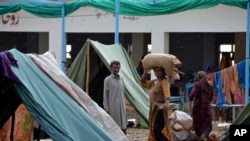The United Nations appealed Tuesday for $160 million to support Pakistan’s response to more than two months of destructive nationwide flash flooding triggered by climate-driven erratic monsoon rains.
Pakistani officials say the calamity has “badly” impacted more than 33 million people and killed more than 1,100 people since the seasonal rainfall began in June.
The U.N., together with the Pakistani government, launched the flash funding appeal simultaneously in Islamabad and Geneva.
“Pakistan is awash in suffering,” U.N. Secretary-General Antonio Guterres told the event in his pre-recorded video message.
“The Pakistani people are facing a monsoon on steroids — the relentless impact of epochal levels of rain and flooding,” he warned. “Millions are homeless, schools and health facilities have been destroyed, livelihoods are shattered, critical infrastructure wiped out, and people’s hopes and dreams have been washed away.”
Guterres said the U.N.’s flash appeal will help provide 5.2 million people with food, water sanitation, emergency education, protection and health support in the South Asian nation.
He noted that Pakistani authorities were responding to “the climate catastrophe” by releasing funds, including immediate cash relief, to flood victims. But the scale of needs was rising like the flood waters, requiring collective and prioritized attention, the U.N. chief said.
“Let us work together to respond quickly and collaboratively to this colossal crisis.”
Climate change
Guterres said that South Asia is one of the world’s global “climate crisis hotspots” and people living in these hotspots are 15 times likely to die from climate impacts.
“Let’s stop sleepwalking towards the destruction of our planet by climate change. Today, it’s Pakistan. Tomorrow, it could be your country,” he warned.
The U.N. chief criticized the lack of action in tackling the climate emergency even as the world continues to experience more and more extreme weather events.
Guterres said “it is outrageous that climate action is being put on the back burner as global emissions of greenhouse gases are still rising, putting all of us — everywhere — in growing danger.”
Pakistani Foreign Minister Bilawal Bhutto Zardari told Tuesday’s televised launching ceremony Pakistan has been battling one of the most severe, totally anomalous cycles of torrential monsoon weather since June, noting rainfall during this period has been equivalent to 3 times the 30-year national average.
“In some cases, the water is just everywhere, in an unbroken horizon of inundation,” Zardari said.
The National Disaster Management Authority, or NDMA, leading the country’s response in coordinating assessments and directing humanitarian relief to affected people, has listed 72 out of the country’s 160 districts as calamity-hit. More than 33 million residents there have been affected, tens of thousands of others displaced, with massive losses inflicted on key cash crops.
The death toll from the floods is likely to increase as some flood-hit towns and villages in the hardest-hit Baluchistan, Sindh provinces as well as in the mountainous north remain cut off due to landslides and flooding, hampering rescue and relief efforts.
The rest of the two provinces, northwestern Khyber Pakhtunkhwa and central Punjab, had also suffered significant losses.
The NDMA noted that more than a million homes, 162 bridges, and nearly 3,500 kilometers of roads across the South Asian nation have been damaged or destroyed. The flooding has also killed more than 800,000 farm animals and damaged vital farmlands and crops, it added.
Army General Akhtar Nawaz, the NDMA chief, told Tuesday’s launching ceremony that Pakistan received 186% more overall seasonal rainfall than its 30-year average. “This is something we had never thought of and we had never experienced.”
Nawaz said the extreme weather conditions followed by an early and excessive monsoon rainfall “with very horrific consequences” were the outcome of the climate change.
“We lost the spring this year, 2022. We moved directly from winter to the summers that was followed by four heatwaves, and where we faced forest fires and our large tracks of forest remained on fire for weeks,” he said.
The flash floods in Pakistan are comparable to those of 2010 when more than 2,000 people were killed.
Pakistani officials informed Tuesday’s event that the economic impact of the flooding could reach at least $10 billion, and may require years to rehabilitate victims.
Some countries, including China, Turkey and the United Arab Emirates, have already sent cargo planes that are carrying tents, food, medicines and other relief supplies, and rescue teams. More relief aid is on the way, according to Pakistani officials.
The United States said it was “deeply saddened” by the devastation caused by flooding throughout Pakistan and pledged to provide $30 million more in life-saving humanitarian assistance to the flood victims.
The International Rescue Committee anticipates a sharp increase in food insecurity and a severe impact on the national economy. “Our needs assessment showed that we are already seeing a major increase in cases of diarrhea, skin infections, malaria and other illnesses,” the group said in a statement.
Pakistan is home to more than 7,000 glaciers, but experts warn rising global temperatures are causing them to melt fast, creating thousands of glacial lakes. The South Asian nation says it is responsible for only less than 1% of greenhouse gas emissions but listed among the top ten countries suffering from the climate change effects.
The International Water Management Institute (IWMI) said it was working closely with Pakistani authorities to help assess the flood damage using remote sensing and satellite imagery to support prioritization of humanitarian responses.
“The unprecedented and early heatwave this year also accelerated the melting of glaciers in the Himalaya, Hindu Kush and Karakoram mountain ranges, creating thousands of glacial lakes in northern Pakistan, around 30 of which could cause a deluge,” said Mohsin Hafeez, the country representative for the IWMI.
He said in written comments shared with VOA that the monsoon system means the catastrophe likely peaked within a week to 10 days, around July, which Pakistani officials say stands as wettest since 1961.







